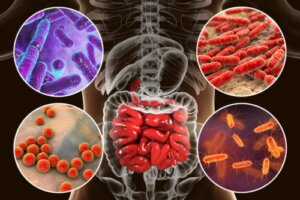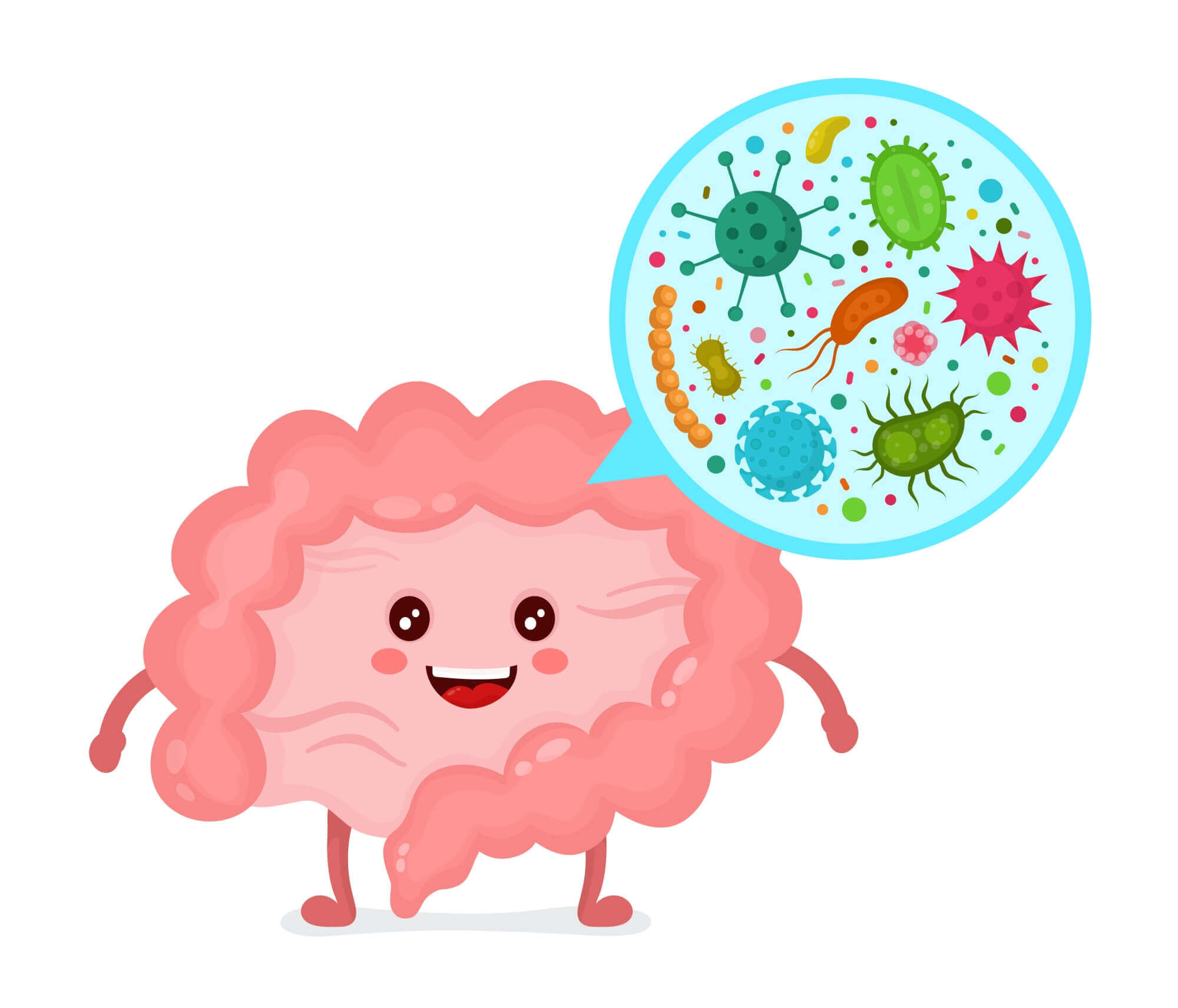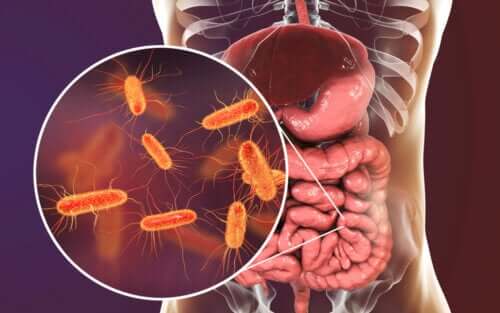My Baby's Gut Flora: Why Does It Matter?

The intestinal microbiome, or gut flora, refers to the repertoire of microbes that inhabit our intestine. According to science, we interact with them from the time we’re in the placenta. At birth, we debut our first repertoire of microbes that we take from our environment, our mother’s skin, and breast milk. Having said that, today we want to talk to you about the importance of your baby’s gut flora.
The microbes that inhabit our bodies are so numerous that they inevitably affect all of the functions in our body. We can visualize them as a huge community – a “consortium” of cells that completes us and integrates us.
Gut flora in numbers
It’s surprising to know that science has estimated that over 1,014 species of microorganisms reside in the gastrointestinal tract of the adult human. These include bacteria, archaea and eukaryotes. According to a 2016 study, the number of microbial cells is approximately equal to the number of human cells in an individual.

The forced coexistence with our intestinal microbiome
With the above numbers in mind, it’s easy to understand that this microbial army performs vital functions for our health. In fact, the impact of our gut flora reaches far beyond the functions of the gut itself.
Among the tasks that scientific studies have already established is protection against possible gastrointestinal pathogens. The fact that the microbiome provides chemical mediators that exercise neuroactive properties is very important. In other words, it influences the brain.
Composition of gut flora has consequences regarding neurological development
Several studies show the importance of establishing a healthy microbial composition in the intestine. The intestinal microbiome begins its formation from the first day of life and stabilizes around the age of 2-3 years. This same period is also characterized by intense neurological development in humans.
In this context, several studies have concluded that early intestinal dysbiosis can influence short-term neurological development. At the same time, it can also lead to mental health problems later in life.
What determines a baby’s gut flora?
Babies receive their first dose of bacteria while inside their mother’s uterus. Later, through our mother’s vaginal and intestinal microflora, if we’re born vaginally. And finally, through breastfeeding and skin-to-skin contact.
It’s a fact that there are significant differences in the intestinal microbiota between babies who breastfeed exclusively and those who drink formula. Exclusive breastfeeding helps the baby develop a healthy and diverse intestinal microbiome.
Human milk contains bacteria (probiotics) that the mother passes on to the baby during breastfeeding. In addition, findings indicate that human milk has an extensive repertoire of oligosaccharides (prebiotics). These serve as food for the good bacteria in the baby’s gut.

What is intestinal dysbiosis?
Intestinal dysbiosis is the alteration of the predominance of species that make up the intestinal microbial ecosystem. It’s important to know that the microbial repertoire within the gastrointestinal tract depends on many factors, including our genetic load, our physiology, and our environment.
Throughout life, the intestinal microbiome will alter, and this alteration will have effects on body functions. In fact, the prolonged imbalance of the intestinal microbiome has been associated with a list of chronic conditions or conditions of unknown origin.
The imbalance of this ecosystem can occur gradually – for example, having to do with eating habits – or suddenly. According to experts, among the main factors that quickly and drastically influence the composition of the microbiome, we can include antibiotic treatment, stress, infection, host genetics, and ingestion.
Diseases that have been associated with intestinal dysbiosis
A body of research highlights the risk of chronic diseases associated with suffering from intestinal dysbiosis in children or adults. For example, irritable bowel syndrome, obesity, diabetes, metabolic syndrome, and allergies.
However, dysbiosis has also been associated with psychiatric disorders – for example, depression, Parkinson’s disease, schizophrenia, autism spectrum disorder, and finally attention deficit hyperactivity disorder.
The intestinal microbiome, or gut flora, refers to the repertoire of microbes that inhabit our intestine. According to science, we interact with them from the time we’re in the placenta. At birth, we debut our first repertoire of microbes that we take from our environment, our mother’s skin, and breast milk. Having said that, today we want to talk to you about the importance of your baby’s gut flora.
The microbes that inhabit our bodies are so numerous that they inevitably affect all of the functions in our body. We can visualize them as a huge community – a “consortium” of cells that completes us and integrates us.
Gut flora in numbers
It’s surprising to know that science has estimated that over 1,014 species of microorganisms reside in the gastrointestinal tract of the adult human. These include bacteria, archaea and eukaryotes. According to a 2016 study, the number of microbial cells is approximately equal to the number of human cells in an individual.

The forced coexistence with our intestinal microbiome
With the above numbers in mind, it’s easy to understand that this microbial army performs vital functions for our health. In fact, the impact of our gut flora reaches far beyond the functions of the gut itself.
Among the tasks that scientific studies have already established is protection against possible gastrointestinal pathogens. The fact that the microbiome provides chemical mediators that exercise neuroactive properties is very important. In other words, it influences the brain.
Composition of gut flora has consequences regarding neurological development
Several studies show the importance of establishing a healthy microbial composition in the intestine. The intestinal microbiome begins its formation from the first day of life and stabilizes around the age of 2-3 years. This same period is also characterized by intense neurological development in humans.
In this context, several studies have concluded that early intestinal dysbiosis can influence short-term neurological development. At the same time, it can also lead to mental health problems later in life.
What determines a baby’s gut flora?
Babies receive their first dose of bacteria while inside their mother’s uterus. Later, through our mother’s vaginal and intestinal microflora, if we’re born vaginally. And finally, through breastfeeding and skin-to-skin contact.
It’s a fact that there are significant differences in the intestinal microbiota between babies who breastfeed exclusively and those who drink formula. Exclusive breastfeeding helps the baby develop a healthy and diverse intestinal microbiome.
Human milk contains bacteria (probiotics) that the mother passes on to the baby during breastfeeding. In addition, findings indicate that human milk has an extensive repertoire of oligosaccharides (prebiotics). These serve as food for the good bacteria in the baby’s gut.

What is intestinal dysbiosis?
Intestinal dysbiosis is the alteration of the predominance of species that make up the intestinal microbial ecosystem. It’s important to know that the microbial repertoire within the gastrointestinal tract depends on many factors, including our genetic load, our physiology, and our environment.
Throughout life, the intestinal microbiome will alter, and this alteration will have effects on body functions. In fact, the prolonged imbalance of the intestinal microbiome has been associated with a list of chronic conditions or conditions of unknown origin.
The imbalance of this ecosystem can occur gradually – for example, having to do with eating habits – or suddenly. According to experts, among the main factors that quickly and drastically influence the composition of the microbiome, we can include antibiotic treatment, stress, infection, host genetics, and ingestion.
Diseases that have been associated with intestinal dysbiosis
A body of research highlights the risk of chronic diseases associated with suffering from intestinal dysbiosis in children or adults. For example, irritable bowel syndrome, obesity, diabetes, metabolic syndrome, and allergies.
However, dysbiosis has also been associated with psychiatric disorders – for example, depression, Parkinson’s disease, schizophrenia, autism spectrum disorder, and finally attention deficit hyperactivity disorder.
All cited sources were thoroughly reviewed by our team to ensure their quality, reliability, currency, and validity. The bibliography of this article was considered reliable and of academic or scientific accuracy.
- Sender, R., Fuchs, S., & Milo, R. (2016). Revised estimates for the number of human and bacteria cells in the body. PLoS biology, 14(8), e1002533.
- Mohajeri, M. H., La Fata, G., Steinert, R. E., & Weber, P. (2018). Relationship between the gut microbiome and brain function. Nutrition reviews, 76(7), 481-496.
- Mohajeri, M. H., Brummer, R. J., Rastall, R. A., Weersma, R. K., Harmsen, H. J., Faas, M., & Eggersdorfer, M. (2018). The role of the microbiome for human health: from basic science to clinical applications. European journal of nutrition, 57(1), 1-14.
- Yang, I., Corwin, E. J., Brennan, P. A., Jordan, S., Murphy, J. R., & Dunlop, A. (2016). The infant microbiome: implications for infant health and neurocognitive development. Nursing research, 65(1), 76.
- Le Doare, K., Holder, B., Bassett, A., & Pannaraj, P. S. (2018). Mother’s milk: a purposeful contribution to the development of the infant microbiota and immunity. Frontiers in immunology, 9, 361. https://www.frontiersin.org/articles/10.3389/fimmu.2018.00361/full
- Van den Elsen, L. W., Garssen, J., Burcelin, R., & Verhasselt, V. (2019). Shaping the gut microbiota by breastfeeding: the gateway to allergy prevention? Frontiers in pediatrics, 7, 47.
This text is provided for informational purposes only and does not replace consultation with a professional. If in doubt, consult your specialist.








